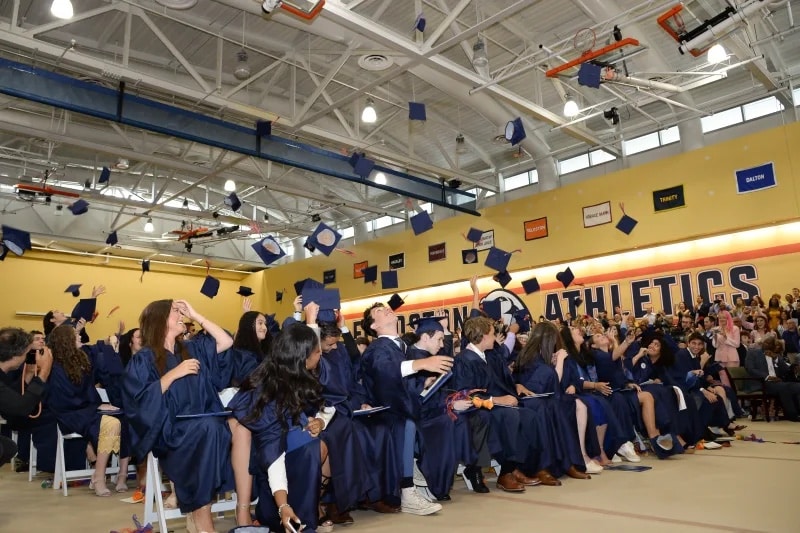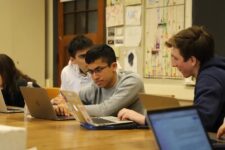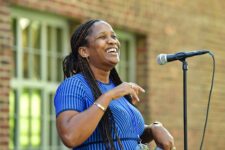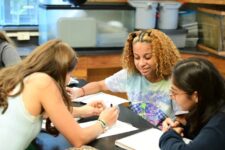Parting Words for the Class of 2019
At 2019’s Commencement, students threw their caps in the air with pride, but not before hearing compelling advice and reflections on life’s bigger questions. Excerpted here are the graduation remarks from Head of School Jessica Bagby and David Belafonte ’75, producer and humanitarian.
Balancing Faith and Doubt
Bagby shared her experience with learning to live with doubts, and how love for our communities can help us remain grounded.
Bagby’s personal journey:
Both of my parents knew that I would always be a seeker and that nothing pat or orthodox would assuage my queasy soul or preoccupation with injustices. My mother probably knew it first as she sat on the edge of my bed every night saying my prayers with me. In those quiet moments, I first began to vocalize my questions. She didn’t have all the answers, and she helped me to imagine how I could live my life fully and richly, with the peace of mind that my days would have worth despite the inevitability of doubt.
My father, I would learn, was also someone who lived in that curious space of ambiguity and paradox. He was deeply principled, but his ethical sense was not religious.
Both in how he lived his life and how he faced his death, he proved rather pragmatic about faith and doubt. For him, living was about living, not worrying about dying.
So at 55 years old, where am I in my struggle with faith and doubt? I am my mother’s child. I am my father’s child. I am still in formation.
And so this brings me to my vocation: teaching. I will begin by confessing that I fought being a teacher. The script of my life I had in mind turned out not to be authentic — it was authored by voices other than my own inner voice. I share this part of my story with you, seniors, because I know all too well how deeply students in schools like this one identify with the pressures to pursue extrinsically versus intrinsically determined notions of success.
Stepping out of the script was scary.
In truth, some days and even some years, like this one, have been overshadowed by profound doubt, almost unbearable doubt about whether any of my efforts or values were understood or mattered or made a difference for anyone. Sometimes courage and faith alone have had to carry me. And then other moments in this work have been so deeply rewarding and life-affirming that I cannot imagine doing anything else.
Nothing inspires my faith more than students and teachers. I believe in the power of education to give life meaning and to help us understand that not much makes a lot of sense in this world except our love and care for one another. Our shared humanity is what sustains us.

Bagby’s advice to the graduates:
Seniors, you have struggled mightily and valiantly in your time here with doubt and faith — painful and punishing doubt and dubious faith — about yourselves and others. As you move forward from this place, I exhort each of you as individuals to find your way to live in love and redeeming grace — for your own sake, for one another, and for all of those souls you have yet to encounter in your lives, some of whom will need your courage or your forgiveness or both. Your life is a gift. Listen to your life telling you who you are. Embrace the questions. Author your own script. And live fully in your own humanity and in the humanity of others, whatever your particular journey may bring.
I hold you in faith and love.
Encouraging Graduates to Take on the World with Enthusiasm
Belafonte shared his wisdom and perspective, covering his own personal story of being the child of a high-profile interracial marriage, his experience with activism as an ECFS student in the 1970s, and his hopes for the generation entering the adult world.
On confronting racism head-on:
At the cellular level, I don’t believe there is a human genome that predisposes any of us to be racist.
Somewhere along our journey we are infected with that insidious virus. It is learned, whether taught directly, through observation, or through cultural osmosis. It’s in our water, in the air we breathe, in our media, and in our art.
How do we unlearn what has seeped into us for so long? Better yet, how can we create a dialogue and a curriculum, starting with the wee little ones, that puts racism, at least, on par with bullying, smoking, or drug abuse? How can we create an atmosphere where one should feel ashamed to be labeled a racist?
There must be a collective willingness to understand and embrace the realities and cold, hard facts of a brutal history — what has led us to this perilous place. We need to begin a healing dialogue, or the world as we know it will never know peace.
Such a dialogue will be uncomfortable and emotional, and extremely angry at times. But the forum has to be a safe place for that discourse to take place, or no one will ever dare speak.

His advice to the graduating class:
Know how lucky you all truly are. Know how lucky you are to have each other. Know how lucky you are to discover yourselves and life’s challenges in this amazing environment while two-thirds of the world’s population walks barefoot and goes hungry.
Recognize the enormous gifts at your disposal that we often tend to take for granted. High on that list, the right to vote. I hope and pray that your generation nationwide learns from generations past and turns out en masse at the voting polls, to be sure that the likes of the madness we are experiencing today never happens again.
Grind until the job gets done. The problems that we have created and tasks that we have set for ourselves as a species can’t possibly yield the desired results in our lifetime. A shift in the thinking paradigm has to take place.
Find pride in working to advocate some kind of change that will set in motion a mandate and an ethic that reflects generosity and empathy in thinking: How will the choices I made today affect my kid’s kid’s kids?
What an incredible opportunity to show the world as it could be.



